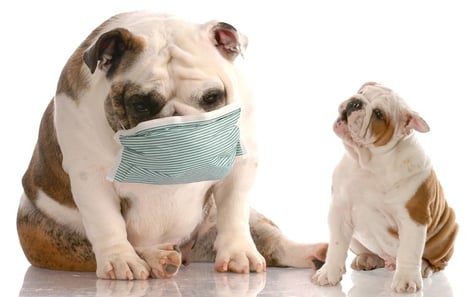From play dates in the park to visits to doggy day camp, dogs today spend lots of time in the company of other canines. This socialization trend is great for our best friends, but it’s important for pet parents to educate themselves about illnesses common among social canines.

Canine cough – medically known as infectious canine tracheobronchitis -- is a term used for infections of the respiratory system that cause a dry, hacking cough and nasal discharge. It can be caused by a number of different viruses – including canine influenza, canine distemper and parainfluenza -- as well as bacteria, notably Bordetella bronchiseptica. Most dogs develop canine cough at least once during their lifetime.
Unfortunately, because the illness has been mislabeled “kennel cough,” many pet owners think it occurs only at boarding kennels. In fact, your dog can be infected anywhere there are other dogs – even on a walk around the neighborhood. The infection is spread through casual contact when dogs breathe or sneeze on each other or meet nose to nose.
Another illness of concern for social canines is the canine influenza virus (CIV), commonly known as dog flu. This contagious respiratory disease is relatively new: it first appeared in 2004 in Florida, but has spread across most of the country. It is caused by a virus (Type A H3N8). Symptoms include runny nose, low-grade fever and a cough.
Just as we are more likely to catch a cold or flu when we’re exposed to many different people, our dogs are more likely to develop these illnesses if they spend time with other canines. All dogs are at risk of exposure, although young puppies and senior dogs with weaker immune systems are most at risk of become sicker.
The good news is that most cases of canine cough and flu will resolve on their own after 10 days to two weeks, much like the colds and flu in humans. If your pet is very uncomfortable, your veterinarian may prescribe cough suppressants. If the illness is caused by a bacterial infection, antibiotics will be needed. In a small percentage of dogs, the illness can progress to pneumonia, with high-grade fever and respiratory distress, and require hospitalization and supportive care. There is a test, which must be sent to an outside laboratory, to determine if your pet has the flu or other not-so-common infection.
Fortunately, there are vaccines that protect against CIV and the most serious causes of canine cough. Boosters are needed annually to maintain the protection. Since viruses evolve over time, they aren’t perfect, but they are inexpensive insurance against an unpleasant and uncomfortable illness.
If your pet spends any time out and about with other dogs, be sure to talk with your veterinarian about these vaccines. And educate yourself on how to care for your pet during canine colds and flu season.




